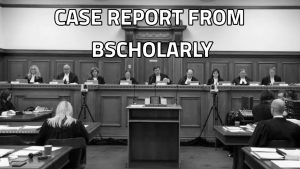Facts, issues and decision in Adamolekun v University of Ibadan (1967) ANLR 225 SC: The Constitution of the Federal Republic of Nigeria is the Supreme law of the land; and as such, usually contains a supremacy clause. The supremacy clause ranks the Constitution as the highest in the hierarchy of laws so that where there is an inconsistency between the Constitution and other laws enacted in the country, the Constitution will prevail and other laws will be void to the extent of their inconsistency.
However, in a Military regime, one of the first things that the military government does is to make a Constitution suspension and modification decree to make some parts of the Constitution inoperative in order to forward their dictatorial regime. This was the case in 1966 with the Decree No.1 of 1966 (Constitution Suspension and Modification Decree), where some parts of the 1963 Republican Constitution were suspended and modified.

They also make an ouster clause to strip the court of its powers of judicial review with regards to certain matters. The military uses this ouster clause as a tool to prevent opposition and perpetuate dictatorianism.
It is also pertinent to note that in a Military regime, there is still a hierarchy of laws, and usually, decrees made by the Central Military government are superior to edicts made by the state or regional Military government.
The case of Adamolekun v. University of Ibadan is a case where various provisions of the Constitution in operation at the time, Decrees and edicts etc., were considered and analyzed to determine the laws to be applied where there is an inconsistency between two laws and where such inconsistency brings about uncertainty and the question of which court will hear an appeal.
Recommended: Mojekwu v Mojekwu: Facts, Issues and Judgment of Court
Facts of Adamolekun v University of Ibadan (Council of UI)
During the military regime, appeals from the High court went directly to the Supreme Court. This was in accordance with Section 117 of the Republican Constitution of 1963.
But while this particular appeal was pending, an edict was made establishing the Western Region Court of Appeal. This was in Section 35 of the Court of Appeal Edict, Western Nigeria, No. 15 of 1967.
The Supreme Court could not hear the case as a result of the operation of this edict.
Even though the above Edict came into force on the 1st day of April 1967, it made provision for appeals that were proposed and pending to the Supreme Court.
While subsection 2 of Section 35 of the Court of Appeal Edict of Western Nigeria, No.15 of 1967 provided that all proposed appeals that were not pending appeals to the supreme Court will be deemed to be appeals to the Court of Appeal of Western Nigeria, subsection 4 of the same section provides that pending appeals shall refer to appeals that have already been entered in the Supreme Court.
The defendants had already filed a notice of appeal, applied for accelerated hearing, and other orders as the court may give. The defendants also requested the record of appeal be delivered to the Supreme for the hearing of the appeal.
An application was, however, brought before the Supreme Court by the defendants in this case after not being satisfied with the decision of the High Court of Ibadan. In the affidavit supporting the application, the defendants complained of the delay in preparing the documents that were to be included in the records.

In determining the effectiveness of the edict, the Supreme Court had to interpret the provisions of Section 6 of Decree no. 1 of 1966 which basically provided that no court in Nigeria could entertain any case as to the validity of any decree or edict in Nigeria.
It also considered the provisions of Section 3(4) of Decree No. 1 of 1966, which provided that where any law made by the Regional Government is inconsistent with that of any law made by the parliament or the Federal Military Government, such a law shall be void to the extent of its inconsistency.
Also see: Exceptions to the principle of delegatus non potest delegare
Issues Determined in Adamolekun v University of Ibadan (Council of UI)
Whether or not the provisions of Section 35 of the Court of Appeal Edict, Western Nigeria, No. 15 of 1967 is inconsistent with the provisions of Section 117 of the Constitution of the Federal Republic of Nigeria.
Whether the case should be heard in the Supreme Court directly or it should be heard in the Court of Appeal of Western Nigeria, first, by virtue of the provisions of the Court of Appeal Edict.
Also see: Can the Supreme Court overrule itself? See Answer here.
Decision of the court in Adamolekun v University of Ibadan (Council of UI)
The application brought to the Supreme Court was determined by the Supreme Court, as to its jurisdiction to hear the matter in light of the Court of Appeal Edict.
While the Counsel to the defendants, Chief F.R.A. Williams argued that the matter be heard in the Supreme Court, the counsel to the plaintiff, Mr. Yinka Ayoola argued that the matter must necessarily be heard in the Court of Appeal of Western Nigeria, first.

The Court in considering the argument, considered the provision of Section 127 of the Republican Constitution of 1963 which provides for the establishment of regional courts, but also provides that the court shall come into existence on the order of the President, which shall be preceded by the approval of both houses of parliament.
The Court also considered the provisions of Sections 52 and 53 of the Constitution of 1963 of Western Nigeria which provides for the establishment of a Court of Appeal that shall come into force on the appointment of the Governor and also provides for cases that will lie to the Court of Appeal.
It was stated that the provisions of Sections 52 and 53 above, must necessarily operate with regards and compliance with the provision of Section 127 of the Constitution.
The defendants/applicants’ counsel cited the case of The Colonial Sugar Refining Co. Ltd. v Irving to argue that even where a new court has been established by a new enactment, such a court and law cannot operate retrospectively, as such would be to interfere with the right of the defendant/applicant.
In light of the hierarchy of laws and the provision of Section 3(4) of Decree No.1 of 1966, it was decided in this case, that there was an inconsistency between the provisions of Section 117 of the Constitution of the Federal Republic of Nigeria, and the provisions of Section 35 of the Court of Appeal Edict, Western Nigeria, No. 15 of 1967.
It held that appeals should come directly to the Supreme Court as provided in the provisions of the Constitution.
The Court held that the provision of Section 6 of Decree no.1 of 1966 was not a provision depriving the Supreme Court or courts of its jurisdiction; that is, the provision was not an ouster clause, but only one that intended to prevent the court from questioning the competence of the Military Government to make laws.
Conclusively, in any setting, be it a democratic one or a military regime, the courts will determine the inconsistency of laws with regard to the hierarchy and superiority of one law to another.

Edeh Samuel Chukwuemeka, ACMC, is a lawyer and a certified mediator/conciliator in Nigeria. He is also a developer with knowledge in various programming languages. Samuel is determined to leverage his skills in technology, SEO, and legal practice to revolutionize the legal profession worldwide by creating web and mobile applications that simplify legal research. Sam is also passionate about educating and providing valuable information to people.